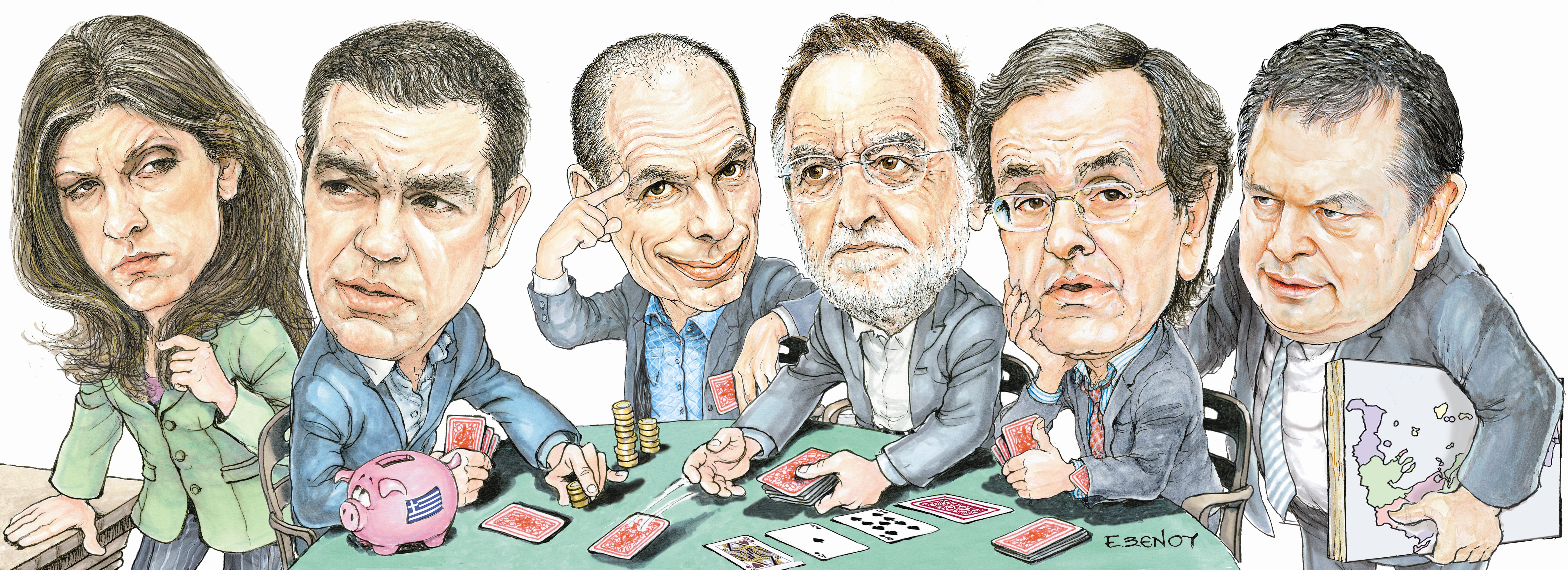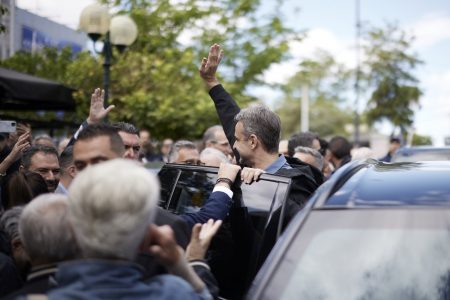Upon returning late on Thursday evening, weary from the long negotiations in Brussels and the accompanying ultimatum, as soon as he got off the plane and without a second though, the Prime Minister headed for the ERT HQ in Agia Paraskevi, which was celebrating resuming broadcasts, two years after the public television network was taken off the air.
The Prime Minister wanted to be amongst the employees, to enjoy the celebrations of a symbolic and significant political struggle with Lampis Tagmatarchis, but primarily to confirm the “people’s trust” towards him.
According to those around him, the Prime Minister is giving it his all for the reserve of political capital that he has created before and after the elections and wants to maintain by all costs, as he considers it his advantage over his opponents who are exhausted and hurt from the long-term financial crisis.
Confidence reserves
In the name of defending the people’s interests and redistributing the burden in favor of the weaker classes, he is supposed to have made the negotiations with creditors and partners reach a critical point and armed with the this impression he is making preparation for a turn in financial policy. With the “people’s trust” he will address inter-party problems and by relying on it, he will even attempt to call early elections in the middle of the summer, should his MPs not be convinced on the necessity of a painful agreement.
The common belief is that the Prime Minister Alexis Tsipras cares about the myth of a leader loved by the people. The symbolism of the reformation and resumption of broadcasts by ERT offered such an opportunity. So on Thursday evening that Prime Minister fell in open arms, shook hands and smiled. He wanted to show to that even before the difficult decisions he is with the people and those in suffering. Previous events, such as the reception of the cleaners at Maximos Mansion and Katroungalos’ legislative efforts to reinstate school wardens, teaches and others driven out by the previous government were in this direction.
Essentially he wanted to dispel the many doubts and complaints in Greek society, which is under major pressure from the long and ineffective, so far, negotiations. He also wants to assure the partner and creditors that despite the differences only he can guarantee social peace and reform. Furthermore, his presence at ERT signaled that he now has his own castle, his own base to transmit signals and messages, a vehicle of communication and propaganda, as evident by the first broadcasts of the new state TV.
The Prime Minister knows whether he achieves a long or short-term agreement, even if he there is a rupture with Europe, he will need this “confidence reserve”. He would prefer a 9-month extension of the current program, so that he has the time to consolidate this relationship of trust with the people and to set the foundations of the new authority that will allow it a long life. Anyone following the Tsipras government closely will realize the goal.
Government in a rush
At first the Prime Minister wants to control the developments in the strategic sector of energy, which will allow him to take advantage of the country’s geopolitical position and expand the new authority’s diplomatic capital. There is a similar interest, with a domestic aim, for the construction sector. For obvious reasons Mr. Tsipras’ group wants to establish itself in the public works arena and of course, it pursues a hegemonic relationship with eh media, which have a very prominent position in the left-wing mythos.
Mr. Tsipras’ stratagem was simply in its conception. He wanted to reach a deal with the least possible political cost with the partners and creditors, which would liberate the Greek economy from the vice on liquidity and would allow him to develop his government’s profile in favor of the people. Along with the initiatives in energy, construction and the media, he believed that he could entrench his new authority and confirm his political hegemony.
As it would appear though, his stratagem has turned out to be very ambitious, while some argue that it is naïve. Its creators underestimated the degree of the country’s dependence and duties towards the rescue programs and the clearly misunderstood the Eurozone’s rules, the relationships of interdependency between European and international organizations, the vastly, interconnected market world and ultimately the structure of the international economic system.
Mr. Tsipras and those by his side wasted time and effort, they were swept way by a long and ineffectual negotiation, they believed that Europe would cave in to the so-called severity of the Greek arguments. As such, they reached the end of the negotiation exhausted, without money, a dry economy and the people agonizing for the next day.
Now the government is in a major rush. It is rushing for the only proposal on the table, risking its cohesion and authority. When the agreement is finally brought forward, he is likely to fund many SYRIZA MPs against him, while the people are exhausted and hostile towards the measures that were considered “anti-populist” – since they were trained that way, primarily by Mr. Tsipras’ new Left.
Samaras and Venizelos looking forward to changes in the political map
Undoubtedly the prime Minister will face many political difficulties in voting in the new measures. It is likely that he will need the help of his opponents, whom he denounced until recently for presumably avoiding or not having the courage to carry out a hard negotiation. That would be the worst for Mr. Tsipras and perhaps his shine will begin to fade.
Everything suggests that Mr. Tsipras will not be able to avoid the impasse that his predecessors met when they came face-to-face with the monster of the deep crisis in Greece. Once again, this will confirm that the Greek crisis is no easy to manage, contrary to popular belief. It demands many painful efforts, many sacrifices and it will likely swallow up many more governments.
It is no coincidence that many in politics are expecting developments. The president of New Democracy Antonis Samaras feels vindicate with the way things are turning out and favors a national consensus, while Evangelos Venizelos argues that “it is time for big things”, suggesting new formations will emerge and the political system will undergo a major reorganization, under the pressure of the upcoming shock and possible failure for SYRIZA.
Antonis Karakousis





